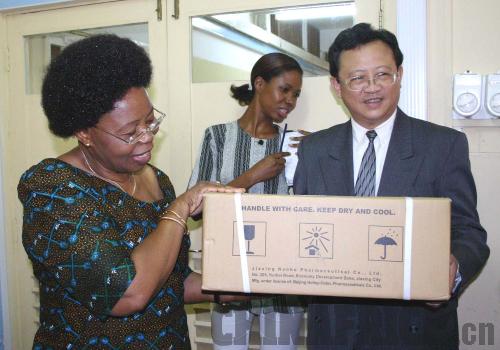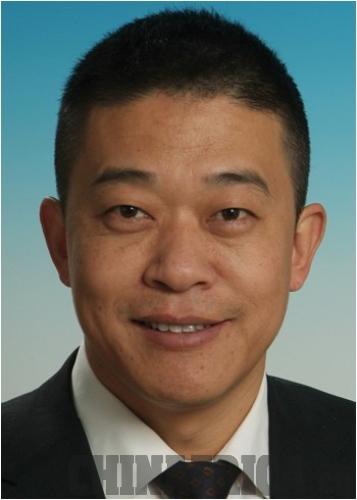|
|

|
|
The Chinese Government donates anti-malaria medicine to Tanzania |
When a Kenyan mother named her daughter Cotecxin, the story behind the name became something of a rural legend. In 1996, a pregnant woman from a village near Kisumu, the capital city of Nyanza Province in west Kenya, caught malignant malaria. If she took quinine, a Western medicine used to cure the disease, she would likely survive, but would either miscarry her pregnancy or have a baby with significant birth defects. To prevent the woman from having to choose between her life and that of her baby, her doctor treated her with Cotecxin, a Chinese-made anti-malaria drug extracted from Artemisinin. She completely recovered and later gave birth to a healthy baby girl. Having already lost two other children to malaria, the mother named her new-born baby Cotecxin.
It was Lu Chunming who took this Chinese anti-malaria drug to Africa, bringing hope to thousands of malaria victims in Africa, including Cotecxin's mother. "During the decades I spent working in Africa, Chinese anti-malaria drugs extracted from Artemisinin cured at least 10 million victims," Lu told ChinAfrica.
Lu was one of the economic figures chosen as a finalist for the 2012 China-Africa Cooperation Award. This award is designed to help African people understand Chinese enterprises and entrepreneurs. He was honored during the First China-Africa Friendship Awards in 2006 by the Chinese-African People's Friendship Association for his prominent contribution to China-Africa friendship and trade cooperation.
In Sub-Saharan Africa, malaria is a prevalent epidemic, and the leading killer of children under five. At the beginning of the new millennium, the World Health Organization (WHO) estimated that there were about 300 million to 500 million people infected with the disease worldwide every year, with Africans accounting for 90 percent of the cases.
Latest statistics from the organization showed that about 216 million people caught malaria worldwide in 2010, of which 81 percent were Africans.
Spreading hope in Africa

Lu, 45, former General Manager of Beijing Holley-Cotec Pharmaceuticals Co. Ltd., has now set up his own business and continues to work in anti-malaria drug promotion. A 1993 graduate of Beijing University of Chinese Medicine, Lu found a job as a technician at Tongrentang pharmaceuticals plant, formerly the designated pharmacy for the royal families of the Qing Dynasty (1644-1911). At that time, Beijing Holley-Cotec Pharmaceuticals had just invented an anti-malaria drug that used Artemisinin as its main ingredient, and needed to promote this new product. Fully aware that the invention was a major accomplishment for Chinese medicine, Lu gave up his stable and well-paid job at Tongrentang, and traveled to Kenya in 1995 with one colleague to promote the new drug on the African continent, where malaria threatened the lives of millions.
"In Africa, malaria is not only a health issue, but also is a social, economic and sometimes political one. For example, African presidential candidates always promise to take new measures to fight malaria in order to win voter support," Lu said. While many political promises went unfulfilled, Lu's arrival on the continent did change the rate of malaria deaths in Africa.
China's anti-malaria drug extracted from Artemisinin is the only traditional Chinese medicine recognized by the WHO to cure malaria. As soon as the People's Republic of China was founded in 1949, Artemisinin was listed as one of the country's research priorities. China is home to about 80 percent of the world Artemisinin resource.
With such advantages and the situation in Africa being so serious, Lu thought marketing the drug there would be easy. However, he soon found his job to be much more difficult than he had anticipated. At that time, quinine, which had been brought to Africa by Europeans, was widely recognized and used as an effective cure for malaria. "Many Africans turned up their noses at Chinese medicine. Some believed that Artemisinin would not cure Africans infected with the disease as our clinical trials had been done on Asian people," Lu recalled.
At that time there were about 2,300 certified doctors in Kenya. During Lu's first eight months in Kenya, he visited over 2,000 local doctors with his colleague, trying to get them to accept and use Cotecxin.
In Africa, Lu has visited every place affected by malaria. He not only faced difficulties in exploring the continent, but also dealt with the hardships of life on the anti-malaria frontlines, including risking being infected with the disease. "We had no running water or electricity," Lu said, adding that their drinking water came from local rivers, or even puddles. He still remembered life in a remote village at northeastern border between Nigeria and Chad in 1999. "We stayed for about one week and only had two bottles of clean water," Lu recalled.
Due to his long-term exposure to malaria, Lu has been infected with the disease three times: once in Africa, and twice after he returned China. But his dedication to Africa was not affected by this danger. "Being infected is only a matter of probability. The experience only made me value every second of life, and determined to do more and to work on what I love," he said.
Lu's persistence and dedication have borne fruit. Cotecxin's sales surpassed $10 million in 2006, marking a major increase from the less than $50,000 sold in 1994. Over that period Lu's sales team expanded from two people to over 200.
But in his own eyes, he is just an ordinary person like others. "I hesitated when I was asked to work in Africa for fear of being infected by the disease myself. I also felt guilty as I have to leave my family behind," he said.
"I am not a warrior or a hero. My persistence was only a part of doing my job. After seeing how people were tortured by malaria, this persistence become an ideal, not only mine, but for all of my colleagues working in Africa. We wanted to cure the victims and to promote Chinese medicine around the world," Lu added.
He took Africa as a training ground for this aspiration. "With Artemisinin as a 'paver,' we would like to build an 'expressway' for Chinese medicine, both produced by us and by other Chinese companies, to be sold on the international market," Lu said.
Besides being a businessman, Lu is also an expert on China-Africa exchanges. He is also the deputy director of the Chinese Research Society of African Affairs. As someone who has had deep grassroot contact with Africans, Lu believes his past experience and current work are indispensable and hopes that his joining will bring fresh and original ideas to the research institute. "What Chinese do in Africa is not purely business, or academic research or diplomacy. Both sides are influencing each other," Lu said, noting that Chinese individuals act as representatives of China in the African communities where they work. |